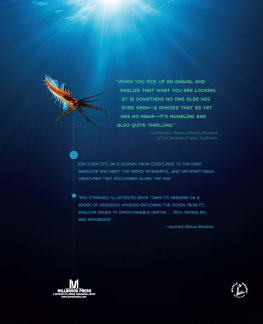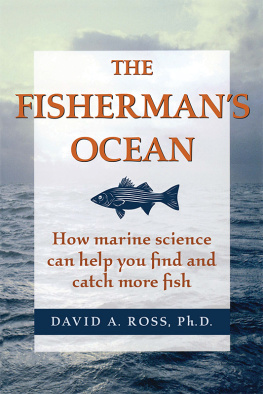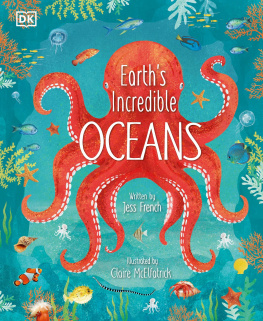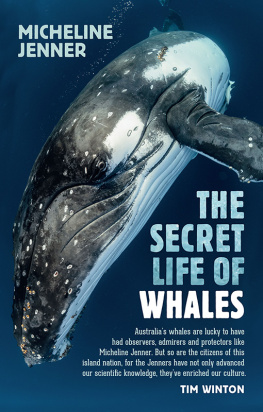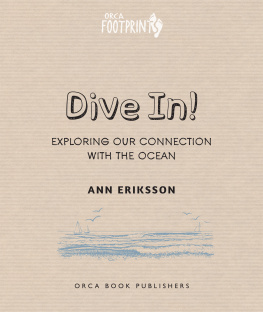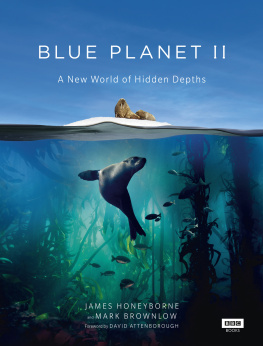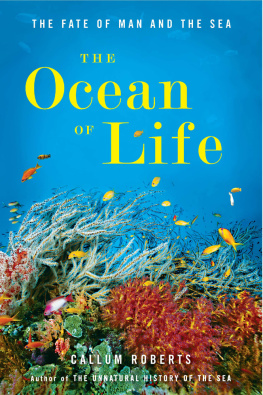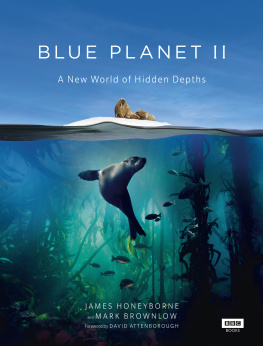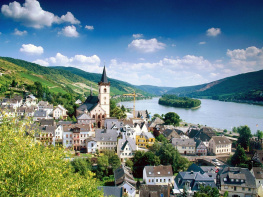First published in English by Greystone Books in 2021
Originally published in German as Das Blaue Wunder: Warum das Meer leuchtet, Fische singen und unsere Beziehung zum Meer so besonders ist by Frauke Bagusche 2019 Ludwig Verlag, part of the Random House GmbH publishing group, Mnchen
English translation copyright 2021 by Jamie McIntosh
Foreword copyright 2021 by Jill Heinerth
21 22 23 24 25 5 4 3 2 1
All rights reserved. No part of this book may be reproduced, stored in a retrieval system or transmitted, in any form or by any means, without the prior written consent of the publisher or a license from The Canadian Copyright Licensing Agency (Access Copyright). For a copyright license, visit accesscopyright.ca or call toll free to 1-800-893-5777.
Greystone Books Ltd.
greystonebooks.com
Cataloguing data available from Library and Archives Canada
ISBN 978-1-77164-604-8 (cloth)
ISBN 978-1-77164-605-5 (epub)
Editing by Tracy Bordian
Proofreading by Alison Strobel
Indexing by Stephen Ullstrom
Front jacket design by Eisele Grafik Design and Nayeli Jimenez Jacket photographs: (front) Shutterstock (Rich Carey), Getty Images (Darryl Leniuk, nudiblue, Justin Lewis, Mark Tipple); (back) Frauke Bagusche Text design by Nayeli Jimenez
Greystone Books gratefully acknowledges the Musqueam, Squamish, and Tsleil-Waututh peoples on whose land our office is located.
Greystone Books thanks the Canada Council for the Arts, the British Columbia Arts Council, the Province of British Columbia through the Book Publishing Tax Credit, and the Government of Canada for supporting our publishing activities.

For my nephews Miguel and Milo
I hope that you will be able to explore the Blue Wonder as I have. My greatest wish is that this book will play a small part in leaving behind a beautiful and habitable world for you to grow up in.
For Anna, Elias, and Dimi
Contents

by Jill Heinerth
If there is magic on this planet, it is contained in water.
LOREN EISELEY
There is nothing wrong with enjoying looking at the surface of the ocean itself, except that when you finally see what goes on underwater, you realize that youve been missing the whole point of the ocean. Staying on the surface all the time is like going to the circus and staring at the outside of the tent.
DAVE BARRY
Foreword

AS A CHILD, I was mesmerized by the images of our big blue marble relayed from space during the Apollo 17 mission. The cobalt seas, vaporous white clouds, and alabaster ice caps appeared like a boundless wilderness, with little sign of humanitys influence. Astronauts, journalists, and the general public spoke in reverence of the image that changed our perception of our place in the universe. Futurist author Arthur C. Clarke expressed it best, saying, How inappropriate to call this planet Earth, when clearly it is Ocean. There are few signs of our influence when the sun shines on our blue marble, but we cannot ignore our interconnectedness. The turquoise water that covers nearly three-quarters of the planets surface appears to flow through everything.
Besides watching the Apollo missions, I was a voracious young reader of non-fiction. Silent Spring and The Sea Around Us, penned by the American marine biologist Rachel Carson, taught me about science and environmentalism, but also about the wondrous beauty that inspired artists, poets, and visionaries to look to the ocean. Carson wrote, In nature, nothing exists alone.
Not since Carsons Silent Spring have I read a book as motivating as The Blue Wonder. Frauke Bagusches cautionary tale is woven seamlessly with a joyous investigation of the peculiar inhabitants of our liquid planet. Learning that blue whales are louder than jets, that bull sharks swim 2,600 miles up the Amazon to the Andean foothills, or that an octopus may brood for 53 months before her babies hatch enthralled me. Learning that I am more likely to get killed by my neighbors dog than by a great white shark made me want to call all my friends with unruly pets and scare them in the way that an entire generation was terrified by the movie Jaws. Considering that a mother sea otter safeguards her pups by tying them in kelp or that a male lobster protects its partner from predators, one is left to reflect on exactly who the intelligent species is on Earth. Looking at the current trajectory of the Anthropocene, it is perhaps not us humans.
Whether you choose to savor one scrumptious anecdote at a time or dive into the issues and solutions for our rapidly changing planet, The Blue Wonder will move you. Enjoy a journey with singing fish, glowing waves, and unimaginable migrations. By discovering the wonders of the ocean, you will be inspired to protect her.
The Earth is 70 percent water. Our bodies are 70 percent water, and we are intertwined in this dance of life. We emerged from the amniotic ocean of our Mothers womb. The sea spills from our tear ducts and sweats from our pores. There is no question that we are water. As we slowly wither with age, and leave the ocean behind, we return to the dust of the cosmos. We will live or die through understanding our blue wonder and the oceans potential to save us from ourselves.
JILL HEINERTH, author of Into the Planet: My Life as a Cave Diver
Preface

IF I HAD to describe myself in a single word, I would say thalassophile hits the nail on the head. A thalassophile is someone who prefers living on the coast or by the sea, someone who, quite simply, loves the ocean. The salty, sea-weedy smell, the crashing waves, and the expanse of the sea have an irresistible pull on me. I find it all incredibly relaxing. It is only once I dip beneath the water, however, that I truly experience what I call my blue wonder. It is there that life is raging. The underwater world has its own tempo and obeys its own rules. It is colorful and in constant motion, and although it is sometimes somewhat uniform, it is always breathtaking.
The mysteries and synergies of the sea have held my interest from my earliest days, so its hardly surprising that I chose to make my passion my profession. I am a marine biologist, heart and soul, and I have (almost) nothing other than salt water in my head. As a marine biologist the scope of my work is very diverse. Of course, I am not always on the water or under its surfacebut as often as possible. Depending on my work, I sometimes dont see the sea for months: say, if I have to analyze samples in the lab, or evaluate data on my computer, or give lectures, or write a book about the sea. When at long last I can once again dive into the sea or snorkel, then I feel as if I have come home.



